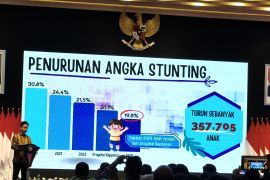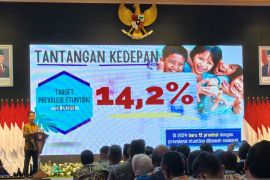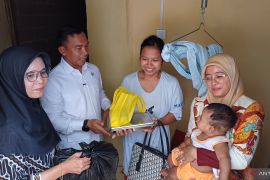As (part of) the government's commitment to protecting the nation's successors, the government continues to put in efforts to reduce the stunting rate. The President himself targets that by 2024, the stunting cases rate will drop to 14 percentJakarta (ANTARA) - The Women's Empowerment and Child Protection Ministry has said that the government is seeking to suppress the national childhood stunting rate to 14 percent by 2024.
"As (part of) the government's commitment to protecting the nation's successors, the government continues to put in efforts to reduce the stunting rate. The President himself targets that by 2024, the stunting cases rate will drop to 14 percent," the deputy secretary for children's rights fulfillment at the ministry, Hendra Jamal, said via video call during the launch of a product for children here on Monday.
Stunting is a condition that affects children under the age of five, which causes them to fail to grow properly due to chronic malnutrition in the first 1,000 days of life. Thus, affected children tend to be shorter than other kids of their age. The Indonesian Toddler Nutrition Status Survey in 2021 pegged stunting prevalence at 24.4 percent, or around 5.33 million toddlers.
Related news: Plan births to prevent boom in non-productive population: BKKBN
Jamal said that the stunting prevalence has declined over the course of years. Basic Health Research in 2018 showed a decline of 6.4 percent over a 5-year period. However, the COVID-19 pandemic has put children at risk of malnutrition, thus increasing stunting rates.
To suppress the rate of stunting, the ministry is focusing on preventive measures that target women and children, a demographic which makes up 65.2 percent of the total national population, he said.
The Women's Empowerment and Child Protection Ministry considers it important to conduct efforts to expedite the utilization of the Children's Forum and the Role of Mothers and Families as Pioneers and Reporters (2P).
The ministry has carried out five measures to reduce stunting: through children, through families, through education units, through the environment, and through regions, he informed.
Related news: KKP distributes 4.7-ton fish to Batam residents to reduce stunting
The efforts through children have involved the initiation of the National Children's Forum, family learning centers, the Collective Movement for Child Marriage Prevention, child-friendly schools and madrasas, child-friendly health centers, prosperous children villages, child-friendly information centers, child-friendly playrooms, and children's creativity centers.
"Then, RT (neighborhood), RW (community), village, sub-district, district, to city, we will make them child-friendly. We want that later, all provinces in Indonesia, become child-friendly provinces, and by 2030, we aim to become a child-friendly Indonesia," he remarked.
The ministry is also collaborating with the relevant ministries and institutions, he said.
"Addressing stunting is a shared responsibility. Not only the government, but also (everyone) in the society, and it must be done in multi-sector. Prevention of stunting itself can begin from fulfilling the best nutritional (needs) in the first 1,000 days of life," Jamal added.
Related news: Stunting eradication crucial to achieve Golden Generation
Related news: Minister calls for 3% annual decline in child stunting prevalence
Translator: Suci Nurhaliza, Mecca Yumna
Editor: Fardah Assegaf
Copyright © ANTARA 2022












